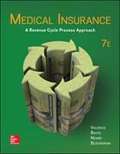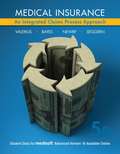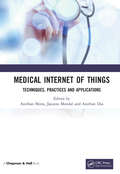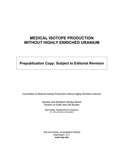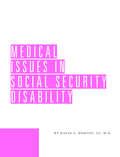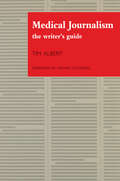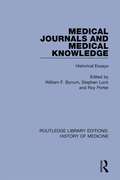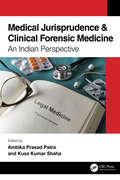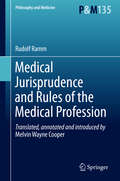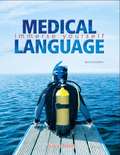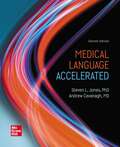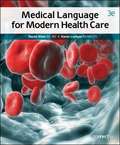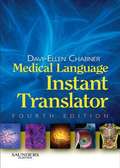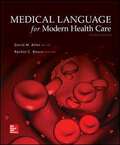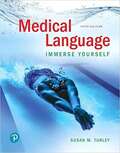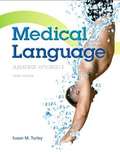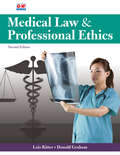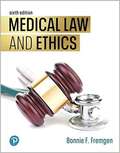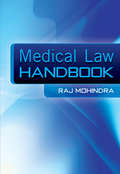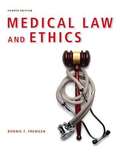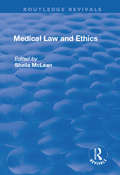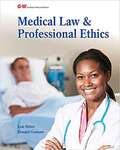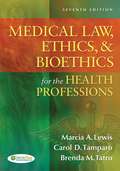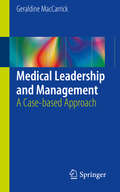- Table View
- List View
Medical Insurance: A Revenue Cycle Process Approach
by Nenna L. Bayes Cynthia Newby Joanne D. Valerius Amy L. BlochowiakMedical insurance plays an important role in the financial well-being of every healthcare business. The regulatory environment of medical insurance is now evolving faster than ever.
Medical Insurance: An Integrated Claims Process Approach (Fifth Edition)
by Nenna L. Bayes Valerius Joanne Valerius Cynthia Newby Janet I. B. SeggernMedical Insurance 5e provides students with the knowledge and skills needed to successfully perform insurance and billing related duties. Following the medical billing process, instruction moves from a comprehensive introductory chapter through processing RA/EOBs and handling patient collections. It has extensive illustrations, forms, and exercises to develop required competencies. Exercises improve underlying essential math and communications skills. This text also provides a fundamental understanding of diagnostic and procedural coding needed to submit claims in compliance with payers' requirements.
Medical Internet of Things: Techniques, Practices and Applications
by Anirban MitraIn recent years, the Medical Internet of Things (MIoT) has emerged as one of the most helpful technological gifts to mankind. With the incredible development in data science, big data technologies, IoT and embedded systems, it is now possible to collect a huge amount of sensitive and personal data, compile it and store it through cloud or edge computing techniques. However, important concerns remain about security and privacy, the preservation of sensitive and personal data, and the efficient transfer, storage and processing of MIoT-based data. Medical Internet of Things: Techniques, Practices and Applications is an attempt to explore new ideas and novel techniques in the area of MIoT. The book is composed of fifteen chapters discussing basic concepts, issues, challenges, case studies and applications in MIoT. This book offers novel advances and applications of MIoT in a precise and clear manner to the research community to achieve in-depth knowledge in the field. This book will help those interested in the field as well as researchers to gain insight into different concepts and their importance in multifaceted applications of real life. This has been done to make the book more flexible and to stimulate further interest in the topic. Features: A systematic overview of concepts in Medical Internet of Things (MIoT) is included. Recent research and some pointers on future advancements in MIoT are discussed. Examples and case studies are included. It is written in an easy-to-understand style with the help of numerous figures and datasets. This book serves as a reference book for scientific investigators who are interested in working on MIoT, as well as researchers developing methodology in this field. It may also be used as a textbook for postgraduate-level courses in computer science or information technology.
Medical Isotope Production without Highly Enriched Uranium
by National Research Council of the National AcademiesThis book is the product of a congressionally mandated study to examine the feasibility of eliminating the use of highly enriched uranium (HEU2) in reactor fuel, reactor targets, and medical isotope production facilities. The book focuses primarily on the use of HEU for the production of the medical isotope molybdenum-99 (Mo-99), whose decay product, technetium-99m3 (Tc-99m), is used in the majority of medical diagnostic imaging procedures in the United States, and secondarily on the use of HEU for research and test reactor fuel. The supply of Mo-99 in the U.S. is likely to be unreliable until newer production sources come online. The reliability of the current supply system is an important medical isotope concern; this book concludes that achieving a cost difference of less than 10 percent in facilities that will need to convert from HEU- to LEU-based Mo-99 production is much less important than is reliability of supply.
Medical Issues in Social Security Disability
by David MortonAuthor Dr. David Morton has personally made more than 50,000 disability determinations for the Social Security Administration. As a Chief Medical Consultant, he hired, trained, supervised, and evaluated the work of both medical doctors and clinical psychologists. Now, Dr. Morton has made his expertise available to claimants' representatives with Medical Issues in Social Security Disability, a revealing and practical look inside the SSA's medical evaluation system. This comprehensive book explains how the SSA interprets key Listings: * What symptoms, physical signs, laboratory test abnormalities, and regimen response are needed to qualify, * The medical data which should be included in the claimant's file to obtain a favorable decision, and * Common issues faced by the claimant or the SSA, with a heavy focus on residual functional capacity. The book is filled with nuggets about shortcomings in submitted medical records, the types of mistakes adjudicators are most likely to make, where generous allowances are provided claimants, ailments and tests frequently overlooked by treating doctors, and much more.
Medical Journalism: The Writer's Guide
by Tim AlbertThis unique and controversial book puts professional practice in the spotlight. It provides excellent comparative teaching material for professionals to help them develop reflective and ethically responsive practice and initiates a long overdue debate. 'One of the main contributions that this book makes is to provide readers from many different backgrounds professional personal and organisational with a vocabulary with which to begin to articulate the importance ambivalence and discomforts that can surround the enactment of values in the turbulent environment surrounding professions of all kinds today. The editors of this book assert that 'values are everybody's business'. It is my belief that readers will become convinced of the veracity of this assertion once they have read the fascinating and very varied discussions of the ways in which values and professions have interacted and continue to interact' John Wyn Owen in the Foreword
Medical Journals and Medical Knowledge: Historical Essays (Routledge Library Editions: History of Medicine #1)
by Roy Porter William F. Bynum Stephen LockOriginally published in 1992 Medical Journals and Medical Knowledge examines both broad developments in print and media and the practice of particular journals such as the British Medical Journal. The book is the first study to address these questions and to examine the impact of regular news on the making of the medical community. The book considers the rise of the medical press, and looks at how it recorded and described principal developments and so promoted medical science and enhanced medical consciousness. This book was a seminal work when first published and was one of the first to consider the importance of the roots of medical journalism, editorial practices and the ways in which the medical journalism altered the world of medicine.
Medical Jurisprudence & Clinical Forensic Medicine: An Indian Perspective
by Mba Frcp Md Dr Ambika Prasad Patra And Dr Kusa Kumar Shaha Ffflm Professor (additional) & Head of Department Faculty Of Medicine Department of Forensic Medicine & Toxicology Jawaharlal Institute of Post-graduate Medical Education & Research India; Member of International Academy of Legal Medicine of Switzerland; Faculty member (by equivalent qualification) of Forensic & Legal Medicine of London; Member of Indian Academy of Forensic Medicine & Indian Society of Toxicology (ex-officio). Dr Kusa Kumar Shaha MbbsThis book on Medical Jurisprudence & Clinical Forensic Medicine addresses the evolving nature of law and medicine. It updates the medicolegal (ML) systems and discusses the concerns related to digitalization of courts, serving a subpoena through social media, ethical/ML issues in nanomedicine, telemedicine and online prescription practices, toxicology and mass disaster. It fulfils the increased demands of students, forensic medicine specialists, clinicians and lawyers to get authentic medicolegal information in situations of ethical dilemma or during ML urgencies. It features case-based discussions on ML and deontological issues supported by the latest legal/statutory information. Key Features:• Discusses the clinical and applied aspects of forensic medicine through illustrative case scenarios and reports.• Addresses the needs of clinicians and forensic medicine specialists in writing medico-legal reports for specific cases.• Provides evidence-based solutions to medicolegal and ethical dilemma faced during routine practice.
Medical Jurisprudence and Rules of the Medical Profession: The Nazi Viewpoint On The Position And Responsibilities Of The Physician In The German National Socialist Society (Philosophy and Medicine #135)
by Rudolf RammThe Nazi Viewpoint on the Position and Responsibilities of the Physician in the German National Socialist Society. This work is translated, annotated and introduced by Melvin Wayne Cooper. This is the first translation in English of Rudolf Ramm’s textbook Ärztliche Rechts- und Standeskunde: Der Arzt als Gesundheitserzieher, translated and introduced by Melvin Wayne Cooper. Medical Jurisprudence and Rules of the Medical Profession has been reported to be an influential manual for medical ethics in Nazi Germany and is commonly quoted as representing the Nazi viewpoint of the position and responsibilities of the physician in the National Socialist society. It interprets the National Socialist Weltanschauung, i.e. the National Socialist Philosophical Worldview, and makes explicit how this world view was to be actuated by the true National Socialist physician. It is a good text to attempt to see the National Socialist medical world view from the perspective of its practitioners. Ramm’s text could be viewed as being analogous to an Army Field Manual for the practicing National Socialist physician. It dictates the specific applications of the legal values and rules which emanate from this Weltanschauung to the developing medical students and practicing National Socialist physicians. According to some scholars Ramm’s book, which was written not only for students but also for postgraduates, and which received positive reviews in German medical journals, is the most important known historical source pertaining to the instruction of Nazi medical ethics. The 1942 edition sold out within a year, and a second edition published in 1943 included an extended appendix of medical laws. Through this book Ramm’s unique text is now available for an English language audience, thanks to the thorough translation and accessible introduction by Melvin Wayne Cooper.
Medical Language (2nd Edition)
by Susan M. TurleyMedical Language is a medical terminology text that truly immerses readers within the language of medicine, so that students can apply their vocabulary within a real-world context. As opposed to fostering rote memorization, this book engages students in an interactive learning experience that will give them a vital tool and inspire them to become truly proficient in medical language.
Medical Language Accelerated
by Steven L. Jones Andrew CavanaghMedical Language Accelerated approaches medical terminology not as words to be memorized but as a language to be learned. If you treat medical terminology as a language and learn how to read terms like sentences, you will be able to communicate clearly as a health care professional and will be a full participant in the culture of medicine. Memorizing definitions is equal to a traveler memorizing a few phrases in another language to help during a brief vacation: It will help a traveler survive for a few days. But if one is going to live in another culture for an extended period of time, learning to speak and understand the language becomes essential.
Medical Language For Modern Health Care (Third Edition)
by David Allan Karen LockyerMedical Language for Modern Health Care, third Edition, uses a Contextual Learning approach to introduce medical terminology within a healthcare environment. Chapters are broken into lessons that present and define terminology through the context of A & P, pathology, as well as clinical and diagnostic procedures. The text is setup in a way that covers one topic at a time, offering contextual content, tables, and exercises all in one place. Word Analysis and Definition Tables provide a color-coded guide to word parts and combining forms, as well as definitions and pronunciations. Now featuring newly added chapters covering Geriatrics, Oncology, Radiology, and Pharmacology. With unfolding patient case studies and documentation, students are introduced to various roles in the healthcare environment, illustrating the real-life application of medical terminology.
Medical Language Instant Translator
by Davi-Ellen ChabnerCommunicate more effectively when you use this pocket reference to medical terms and other useful information! Davi-Ellen Chabner's Medical Language Instant Translator, 4th Edition provides the tools you need to understand medical terminology. You can also access key information on common diagnostic tests and procedures, the top 100 prescription drugs, medical abbreviations, symbols, and acronyms - and much more. Based on Chabner's The Language of Medicine, this practical resource is ideal for any health care environment!Get quick, portable access to key medical terms and other need-to-know information. Decipher complicated medical terms by recognizing and finding the meanings of individual word parts. Distinguish between commonly misunderstood medical terms (e.g., ureter vs. urethra, or para vs. peri). Become familiar with common diagnostic tests and procedures and why they are ordered. Access information on medical abbreviations, symbols, acronyms, and professional designations. Understand the basics of surgical instruments, terminology, and technology. Identify the top 100 prescription drugs and their uses. Quickly access the top 100 diagnoses and associated procedures. Find the definitions of complementary and alternative medicine terms. Recognize specialized terms used in medical records. Review body systems anatomy with full-color illustrations.Adds a new section on eponyms -words based on or derived from a person's name. Adds a new section on Major Diagnostic Categories & Diagnosis-Related Groups (DRG). Includes updates corresponding to those in the Language of Medicine, 9th Edition, by Davi-Ellen Chabner.
Medical Language for Modern Health Care
by David Allan Rachel BascoMedical Language for Modern Health Care, Fourth Edition, uses a Contextual Learning approach to introduce medical terminology within a healthcare environment. Chapters are broken into lessons that present and define terminology through the context of A & P, pathology, diagnostic and therapeutic procedures as well as pharmacology. The text is setup in a way that covers one topic at a time, offering contextual content, tables, and exercises all in one place. Word Analysis and Definition Tables provide a color-coded guide to word parts deconstruction, definitions and pronunciations. Chapters covering Geriatrics, Oncology, Radiology, and Pharmacology offer comprehensive topics coverage. With unfolding patient case studies and documentation, students are introduced to various roles in the healthcare environment, illustrating the real-life application of medical terminology.
Medical Language: Immerse Yourself
by Susan TurleyFor courses in medical terminology. <p><p> An immersive deep-dive into medical terminology Medical Language: Immerse Yourself is grounded in immersive language learning. Rather than memorizing vocabulary, students experience the sights and sounds of health care as they listen, speak, write, watch, examine, and think. A greater quantity and variety of exercises than any other text maximize opportunities to reinforce learning. The 5th edition retains its organization by medical specialty ― the way medicine is practiced in the real world. New to the 5th edition is a reorganization into 15 chapters, perfect for a 16-week course, and into five sections correlated with learning outcomes. Each section ends with new Practice Laps evaluating student competency and underscoring learning goals.
Medical Language: Immerse Yourself (Third Edition)
by Susan M. TurleyNow in its Third Edition,Medical Language has touched the lives of more people than any other medical terminology book. This intensely visual, powerfully relevant book is organized to promote exceptionally effective instruction and maximum student success. Fully updated to cover the field's newest terminology, this edition retains a deep focus on word building, and enhances teaching and learning in many ways -- including a state-of-the-art immersive online study experience. Its appealing, uncluttered design contains hundreds of rich images and plenty of white space for easy reading and note taking. Student learning is promoted through an unsurpassed quantity and variety of exercises, more colorful, interesting, and large illustrations, and - as requested by most instructors - an intuitive organization around medical specialties. In addition to content updates throughout, this edition is complemented by a brand new set of Dynamic Lectures: comprehensive audio/visual learning experiences narrated by the author.
Medical Law & Professional Ethics
by Lois Ritter and Donald GrahamMedical Law Professional Ethics focuses on the relationships among healthcare, law, and ethics and the application of legal and ethical principles to the healthcare field. This introductory text, targeted for beginning healthcare students, covers topics such as patient and healthcare-provider rights and related laws, legal issues related to health information technology, and legal issues regarding healthcare across the lifespan. In addition, the text explores situations and dilemmas that may arise when professional roles and personal ethics collide.
Medical Law And Ethics
by Bonnie FremgenFor courses in medical law or ethics in programs for nurses, medical assistants, and other allied health care professionals. A plain-language guide to the law and ethics of healthcare Medical Law and Ethics examines the essentials of pertinent laws and the ethical demands of healthcare professions. Clear and readable, the text helps students identify the ethical norms they will adhere to in their chosen field. Real legal cases and stimulating exercises challenge learners to envision their responses to legal and ethical dilemmas in healthcare today. The 6th edition covers issues of increasing concern in hospitals and medical offices, including the opioid crisis in the US, electronic recordkeeping, and the needs of elderly and handicapped populations. New! Also available with MyLab Health Professions By combining trusted author content with digital tools and a flexible platform, MyLab personalizes the learning experience and improves results for each student. Developed for allied health students and instructors, MyLab Health Professions supports students’ mastery and application of the skills they’ll need for a successful career in health care.
Medical Law Handbook: The Epidemiologically Based Needs Assessment Reviews, Low Back Pain - Second Series
by Alison Davies Raj MohindraLaw touches more and more upon the daily practice of medical professionals. This trend continues as modern medicine delivers more therapies, and modern society demands increased rights for individuals and increased accountability for medical professionals. This handbook is written by a practising physician and qualified lawyer to provide an accessible text that allows medical professionals to grasp the legal rules that impact on their daily practice quickly and clearly. The handbook format and clear numbered paragraphs aid speed of use, and legal references are matched to short case summaries and legal statute summaries throughout to provide a solid evidence base. The work enables practitioners to clarify legal questions in all key areas in moments. It concisely and comprehensively covers the core topics including confidentiality, consent, and negligence, and clarifies particularly complex issues such as abortion, assisted reproduction, surrogacy, human tissue and the end of life. This book is an essential reference for medical professionals at every level and in every setting, from students to consultants. 'The purpose of this book is to provide an accessible resource for busy medical professionals. The text assumes no knowledge of law. The medical factual details that are often frustratingly missing from legal textbooks are retained. The point is to locate the cases not just on the legal maps but also upon the medical maps.' Raj Mohindra in the Introduction
Medical Law and Ethics
by Bonnie FremgenThis is a complete, accessible, and up-to-date guide to the law and ethics of healthcare. Written for health professionals of all kinds - not lawyers - MEDICAL LAW AND ETHICS, 4/e covers the full spectrum of topics that affect practice. Fully updated coverage includes: the legal system, professional liability and medical malpractice, physician's responsibilities, medical records, ethical and bioethical issues, and current regulations. Actual legal cases illuminate subjects ranging from patient confidentiality and abortion to death and dying. Exclusive Med Tips provide quick scenarios and guidance about law and ethics. Each chapter contains glossary terms, exercises, and an actual case; appendices provide current sample codes of ethics.
Medical Law and Ethics: Medical Ethics And Human Rights (Routledge Revivals)
by Sheila McLeanThis title was first published in 2002.The wide range of essays contained within this volume present contemporary thinking on the legal and ethical implications surrounding modern medical practice.
Medical Law and Medical Ethics
by Nils Hoppe José MiolaThis book advances a new approach, based on existing law, to constructing entitlements in human tissue and resolving resulting property conflicts. A new methodology is also put forward for abstracting different concepts within the debate which enables comparison and distinction between different cases of entitlement and retention.
Medical Law and Professional Ethics
by Donald Graham Lois RitterMedical Law and Professional Ethics focuses on the interrelationship of healthcare, law, and ethics and the application of legal and ethical principles to the healthcare field. This introductory text covers topics such as patient and healthcare-provider rights and related laws, legal issues related to health information technology, and medical-legal issues across the lifespan. In addition, situations and dilemmas that arise when professional roles and personal ethics collide are explored. Special features include case studies, court cases, and “what-if?” ethical scenarios that promote critical thinking and foster class discussion. An engaging career-focus feature introduces students to a broad range of professions in which medical law and professional ethics intersect. <P><P>Chapter-review material includes a variety of questions and activities to reinforce comprehension of key concepts covered in the text. Logically organized chapter content, straightforward writing, and dynamic visual aids promote and reinforce student understanding. Ethical scenarios go beyond familiar, high-profile cases by addressing situations and dilemmas more common in everyday life. Rather than focusing on how to avoid litigation, the use of law and ethics to improve healthcare systems and the delivery of care is emphasized and encouraged.
Medical Law, Ethics, and Bioethics for the Health Professions (Seventh Edition)
by Marcia A. Lewis Carol D. Tamparo Brenda M. TatroNow in its Seventh Edition, this groundbreaking book continues to champion the "Have a Care" approach, while also providing readers with a strong ethical and legal foundation that enables them to better serve their clients. The book addresses all major issues facing healthcare professionals today, including legal concerns, important ethical issues, and the emerging area of bioethics.
Medical Leadership and Management
by Geraldine MaccarrickLeadership and management in the context of healthcare is about improving the quality of medical care delivered at all levels. Doctors frequently lead healthcare teams with responsibility for significant clinical resource which requires management and leadership skills regardless of specialty. A growing body of literature has also argued that medical leadership plays an integral part in the success and effectiveness of organisational change in the health sector. Being an effective medical leader requires a different set of skills from being a good clinician. It is therefore important that future medical graduates are supported and equipped with the high-level skills required for their role (e. g. leading and developing multidisciplinary teams, understanding organizational systems, processes and interdependencies, redesigning services and working collaboratively with a wide range of stakeholders). This growing interest across the globe in preparing medical graduates for the role of medical manager and leader requires a comprehensive approach to education and training which begins at an undergraduate level. As an undergraduate these skills are frequently neglected or not taught well. However, with the correct resources and using a case-based approach the undergraduate program can easily support the development of practical leadership and management skills. The case studies and supporting text will provide an overview of the fundamentals of leadership theory and practice relevant to medical students, junior doctors and specialty trainees. Using internationally recognized competency frameworks this book will support the acquisition of knowledge and skills relevant to medical management and leadership such as project management, intelligent leadership, presentation skills, audit, organizational decision making and engaging relevant stakeholders.
